Install Huzzler App
Install our app for a better experience and quick access to Huzzler.
Making some efforts to improve SEO and looks like Its started to appear

- picked a problem i had myself: wasting weeks building stuff no one paid for
- no landing page at first. just a pinned tweet and a public google sheet. shared early wins. that helped way more than a pretty site
- posted weekly on x about real results. ugly screenshots, revenue numbers, what i’d build if i had no job. no filters, no fluff
- kept product updates dead simple: sheet link + telegram access. didn't overbuild. focused only on speed + clarity
- most of the growth came from 3 things:
- x (twitter): showing receipts, not ideas
- indie hacker comment sections: leaving value, not links
- niche telegram groups: not pitching, just helping
- reddit: used throwaway accounts to ask "what would you build if you lost your job today?" and answered my own questions with mini-case studies. these got saved a lot, which helped visibility
- built a lead magnet that didn’t suck: gave away 10 validated ideas for free, full breakdown. no email needed. people shared it
- x (twitter) growth trick: added “$15k/mrr” and “validated saas ideas weekly” in my name. helped people find me when they searched for “saas” or “mrr”
- faked urgency without lying: “50% off till end of month” worked better than i expected. people wait for a reason to buy
- used posts as validation: if an idea i shared got comments or dms, i flagged it for possible product expansion
- never used ads, never emailed cold, never begged influencers. just made it easy for people to see value in 5 seconds
- kept price low enough to feel obvious but high enough to not attract freebie hunters. $79 once → worth it to anyone serious
if you’re a solo founder: pick a problem you live. post the journey in public. make the product simple enough to explain in a tweet. don’t stop for 90 days.
validatedsaas.com still grows weekly. all organic. no bs.
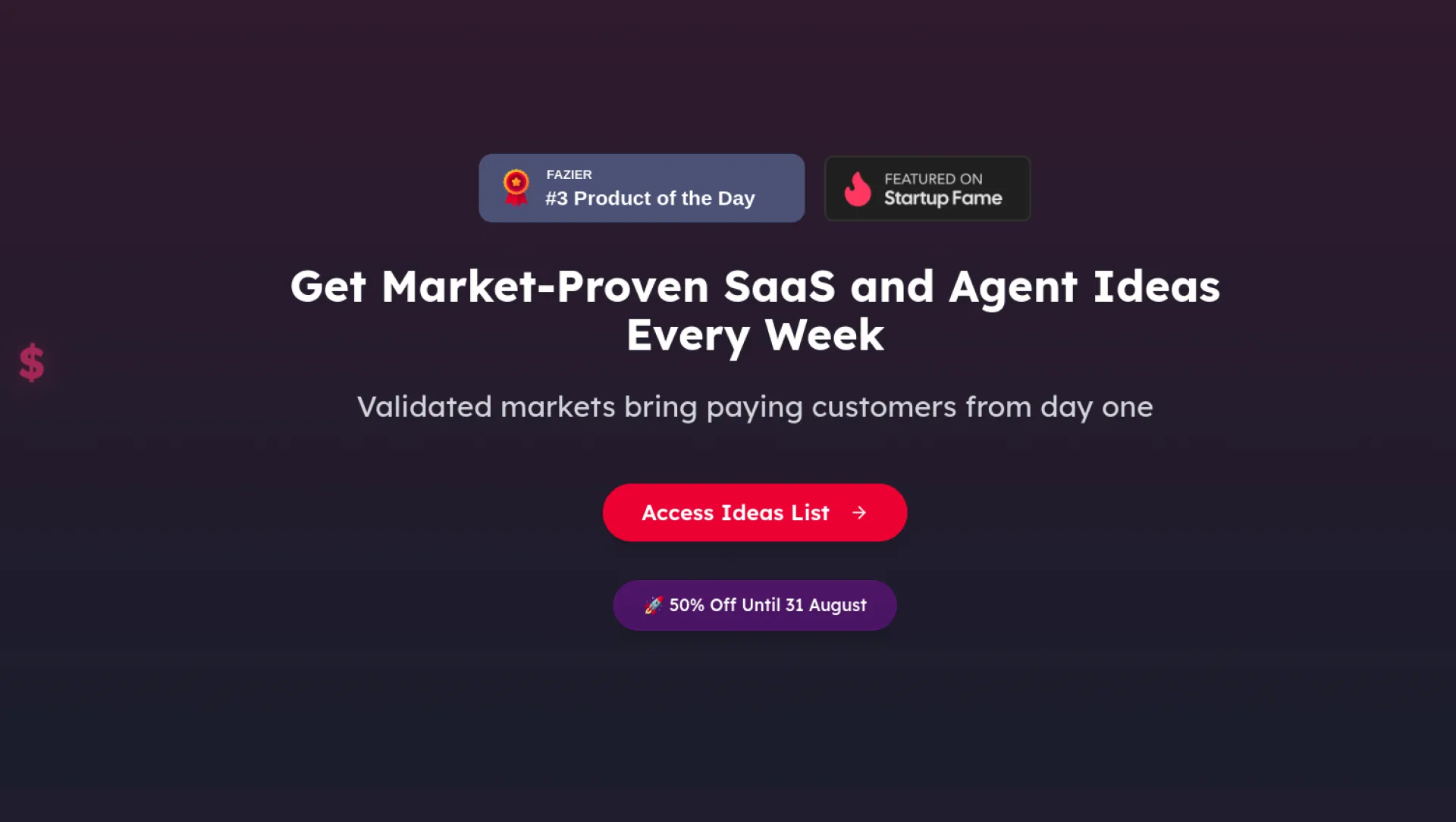
Reach thousands of active founders looking for tools to solve their problems. Our Featured Product placement guarantees premium visibility with 7,458 weekly impressions for post ads (like you are reading right now).
Get direct access to your perfect target audience - people actively building, launching, and growing startups who are ready to invest in solutions like yours. Limited weekly slots available.
Reserve yours now at huzzler.so/advertise
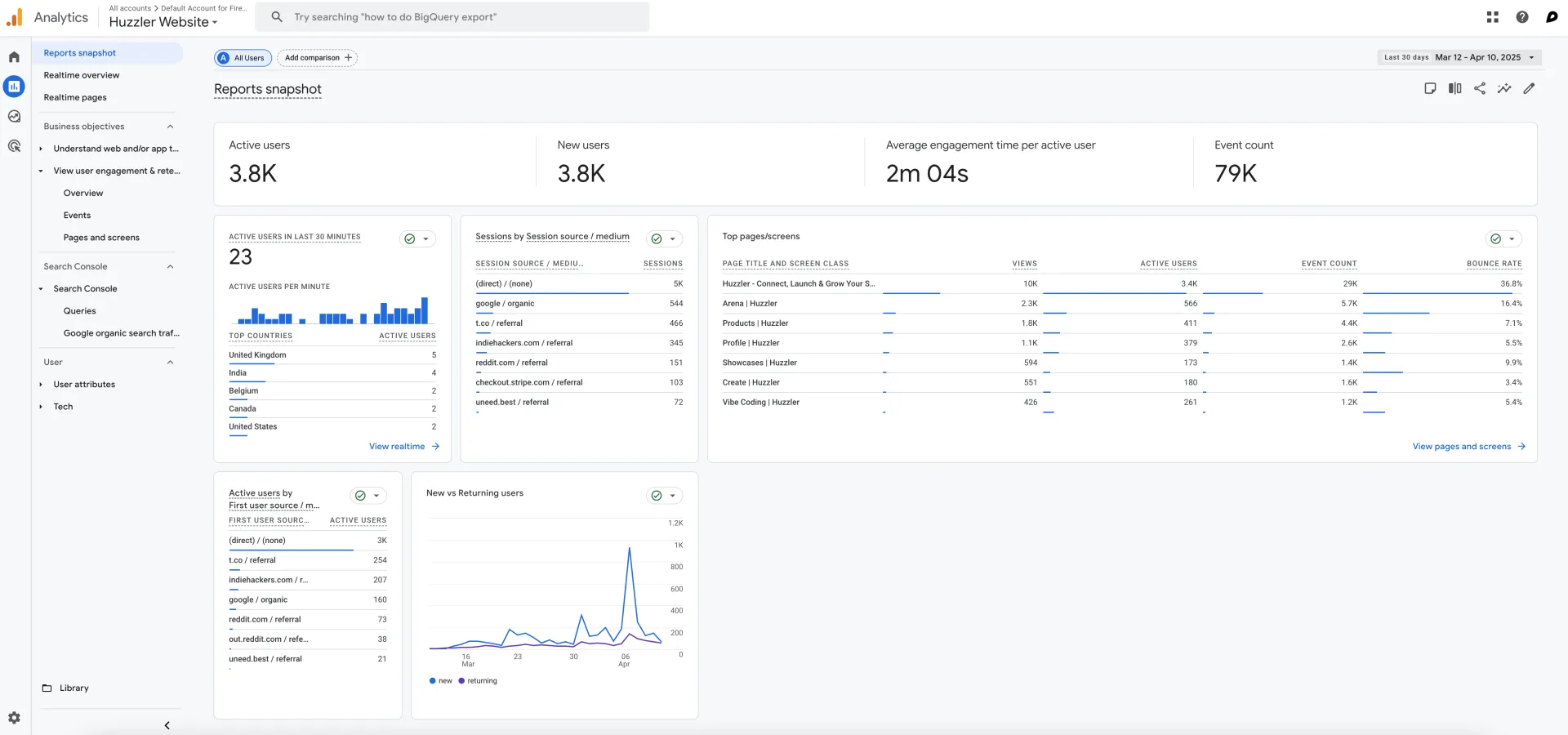
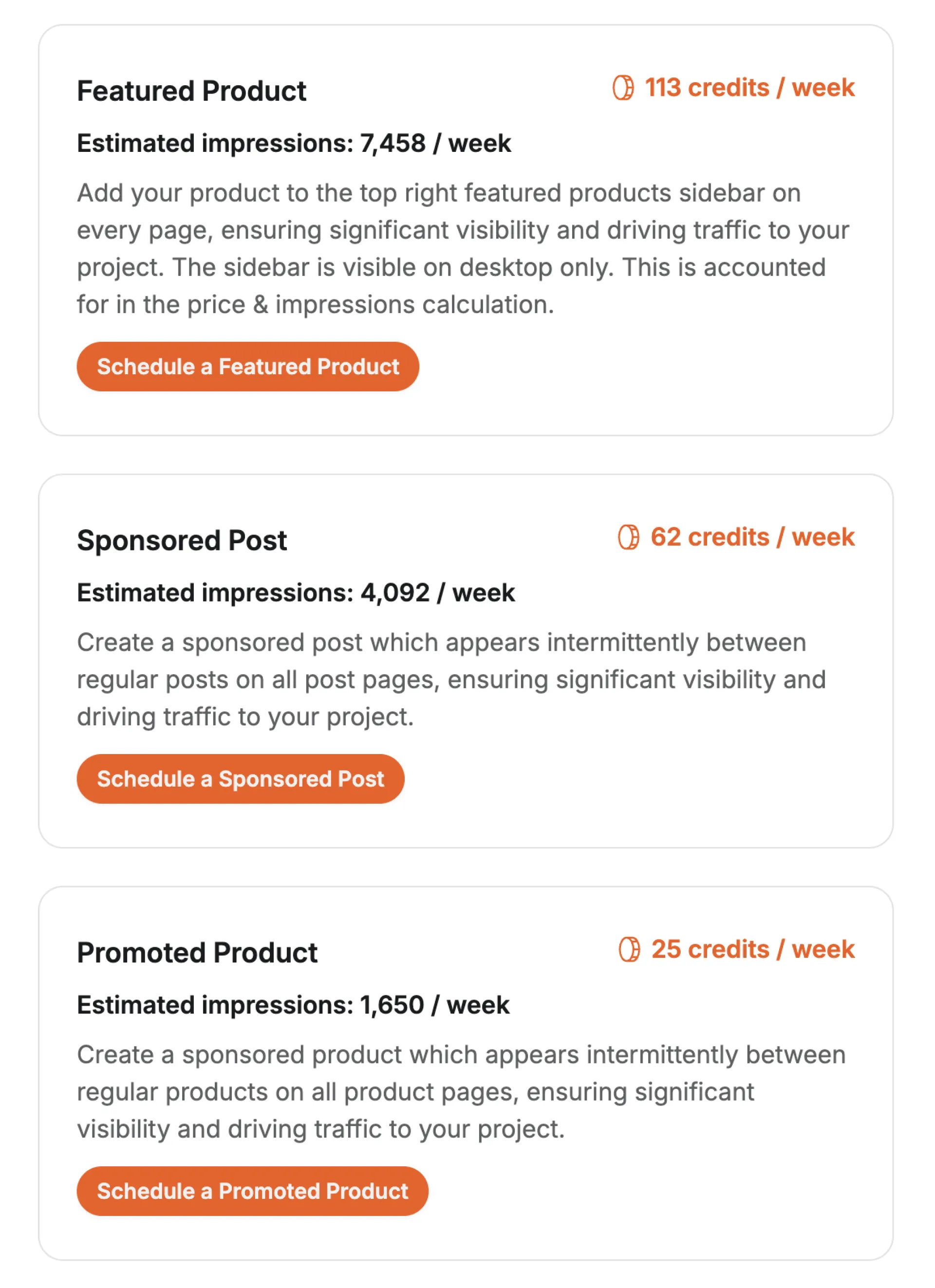
How i run a lean saas in 2025 without losing my mind:
- i don’t do paid ads, cold dms, or chase trends. i let distribution work for me. here's how
- added a public roadmap with feature requests via jotform + notion. users like voting on what matters. gives them a reason to share with others too
- i built SEO pages that don’t feel like SEO pages. used simple questions as page titles like "how do i solve x without doing y". wrote answers like a human, not a blogger
- then i post those q&a answers in reddit comments, indiehackers, and quora. no links. just useful answers. people google the question and land on my page anyway
- embedded chat on every page (via typedream’s chat widget) with one question: "what’s missing here?" got free feedback and content ideas daily
- joined 2 niche slack communities with actual builders. didn’t pitch anything. just posted updates of what i was working on. people asked to try it
- i automated onboarding emails using buttondown and kept them super short. no HTML. just "here’s what most users do next" and a link
- every month i post revenue breakdowns even if it sucks. transparency builds followers. followers turn into users. users bring more users
- when i feel burnt out, i just ship smaller features. i don't grind harder. momentum beats scale
- people underestimate how much you can grow by just being consistent and useful for 12 months straight. that’s it. no viral hack. just not quitting
if you're solo in 2025, your biggest edge is not trying to look big. just be real, show work, and ship stuff that works
PS. building something good? if you want honest feedback that actually helps, i'm here. ZeroToCustomers.com - get all kinds of help you need to get traction and scale faster.
Im quite new to coding and are soon going to launch my website that I vibe coded into something amazing.
- Where to host and how does it work?
- How does it work if I need to post articles or run scripts in the code?
As part of your project, do you think including this for MVP is important and users expect it?
If so, what system do you use? Own form? Third-party tool? Nothing?
I can see Huzzler uses featurebase.app but it also has a roadmap, which you need to keep updated also.
Thanks!
Huzzler's UI is awesome. Just trying it out. I just hate this 50 Character limitttttttt
(for solo founders who actually care)
- stop writing for "keywords" like it's 2015. instead, write for 'questions people ask inside communities'. i search reddit and slack threads and answer them better than anyone else. that's it.
- use tools like alsoasked .com and detailed .com to find what’s missing in top pages. don’t copy. find the gaps. google ranks “fresh angles” now because ai spam is drowning search.
- write in plain english. kill the structure. stop writing like a robot. the more your stuff sounds like how people talk, the more google trusts it’s real.
- give actual data or firsthand experiences. i once ranked a 300-word answer that just walked through what i did with screenshots. no intro, no outro. just value.
- every page should have one job. not five. pick a single intent and go deep. google is rewarding this because ai content usually tries to cover everything surface-level.
- write fast, publish faster. i treat content like testing startup ideas. if it doesn’t get impressions in 3 weeks, i kill or rework it. no point clinging to dead pages.
- don’t waste time chasing backlinks from random blogs. write content that actually helps people, drop it in places where people are already asking, and let it spread naturally.
- bonus trick: google your competitor + “pdf” or “filetype:pdf” and you’ll find docs they’ve written and hidden. i use these to find keywords and copy structures that already work.
this works. it’s what i do. no fluff, no outreach, no ads.
just show up where people look for answers and be better than the lazy ai spam clogging up the feed.
PS. I help founders rank higher on AI search. Get AI SEO report for your site at LM-SEO.com if you are trying to improve your ranking.

- most people treat their mvp like a product. it's not. it's a test.
- if you're building before validating demand, you're guessing. and guessing adds 3-6 months of wasted time minimum
- mvp doesn't mean "code something fast" - it means "test an offer with real users fast"
Here's what actually works in 2025 if you're a solo founder:
- skip landing pages unless you already have traffic. instead, use a pinned tweet or a google form. quicker. easier to iterate.
- don't touch no-code tools until you've had at least 20 convos or email replies from people saying "i want this now"
- use reddit search + search operators like: site:reddit .com "looking for [your solution]" - that's free customer research
- steal phrases from reddit comments or amazon reviews and use them in your offer copy. it converts better than anything you’ll write
- build your waitlist manually. dm everyone who liked your idea post. not with "buy now" spam - ask what problem they actually have
- treat x (twitter) like a search engine. post your mvp concept + what you’re testing. people will tell you what’s broken in minutes
- post daily. not to go viral. but to gather signal. what hits? what flops? you're not building a product, you're refining a problem.
bonus tip: search your mvp idea on tiktok comments. tons of people explain exactly what they want in plain language. steal that.
Raw truth: no one cares what you're building. they care if it solves something that already bothers them.
validate the problem. validate the willingness to pay. then build.
PS. I give honest feedback about your product/idea so you don’t waste time, money, or effort - get any kind of help you need at ZeroToCustomers .com

Hey Huzzlers, Vincent here 👋 (founder of Huzzler).
Working on Huzzler for the last 6 months (2400+ founders, 1400+ products), I've started seeing a pattern: incredible products with 0 customers. It's truly saddening. So much potential, but people don't even know these products exist.
Most founders try to post on Huzzler, Product Hunt, X, Reddit , try ads.. but no results.
So I started wondering, what exactly is the problem? not enough information? bad products? Badly configured ads? ... No influence?
None of that. What worked for me (to grow Huzzler) was creating a system that forced me to:
- Define ONE narrow ICP (stop selling to everyone)
- Update messaging to resonate with that ICP
- Follow a daily routine of tasks
- Build a permanent Knowledge Base
This is why I'm building the Customer Engine: it's a system specifically Built for B2B SaaS founders who need their first paying customers. It works for any kind of B2B SaaS. You can see all features on the website
Why $499 one-time instead of a subscription?
The goal was to create an asset (the Customer Engine) you buy once and profit from forever. No monthly fees eating away at your profits.
E.g. If Customer Engine helps you land just 2 customers at $45/month, it pays for itself in 3 months. After 12 months, that's a $5,000+ ROI.
And that's for only ONE product. You get unlimited projects with lifetime access, so you can use it for every SaaS you build. The ROI compounds. Plus you get all future updates.
(Affiliates coming soon)
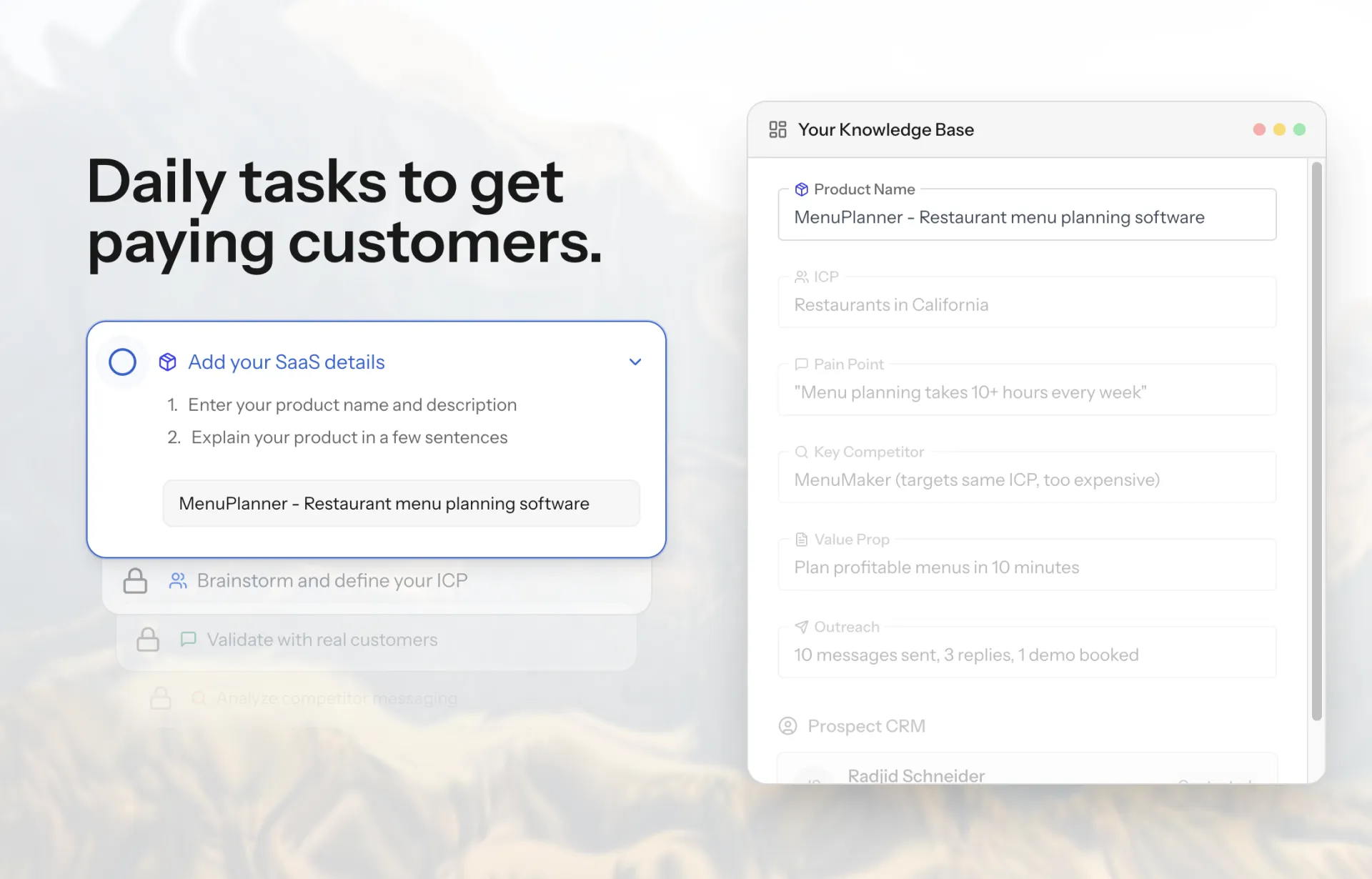
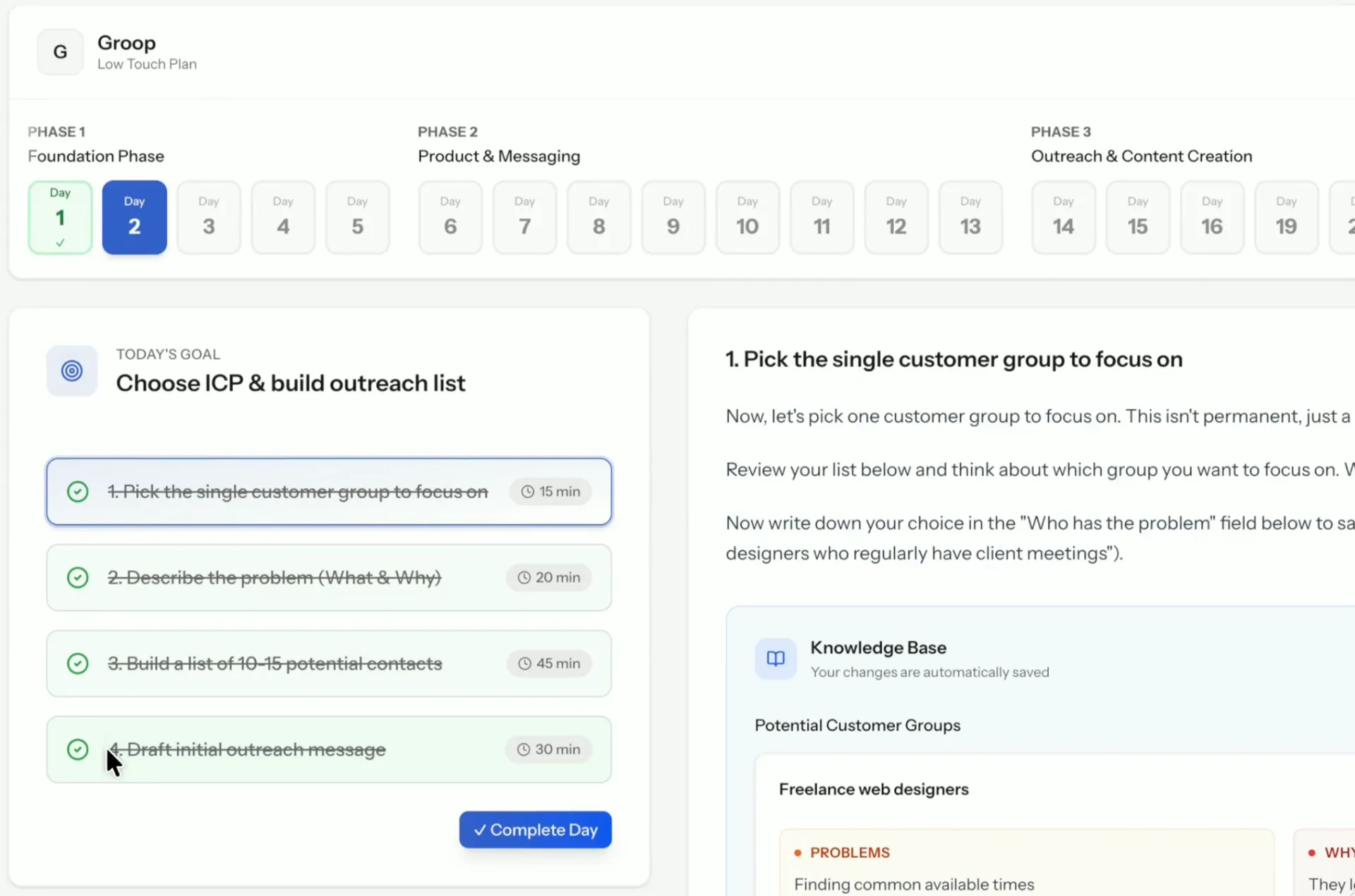
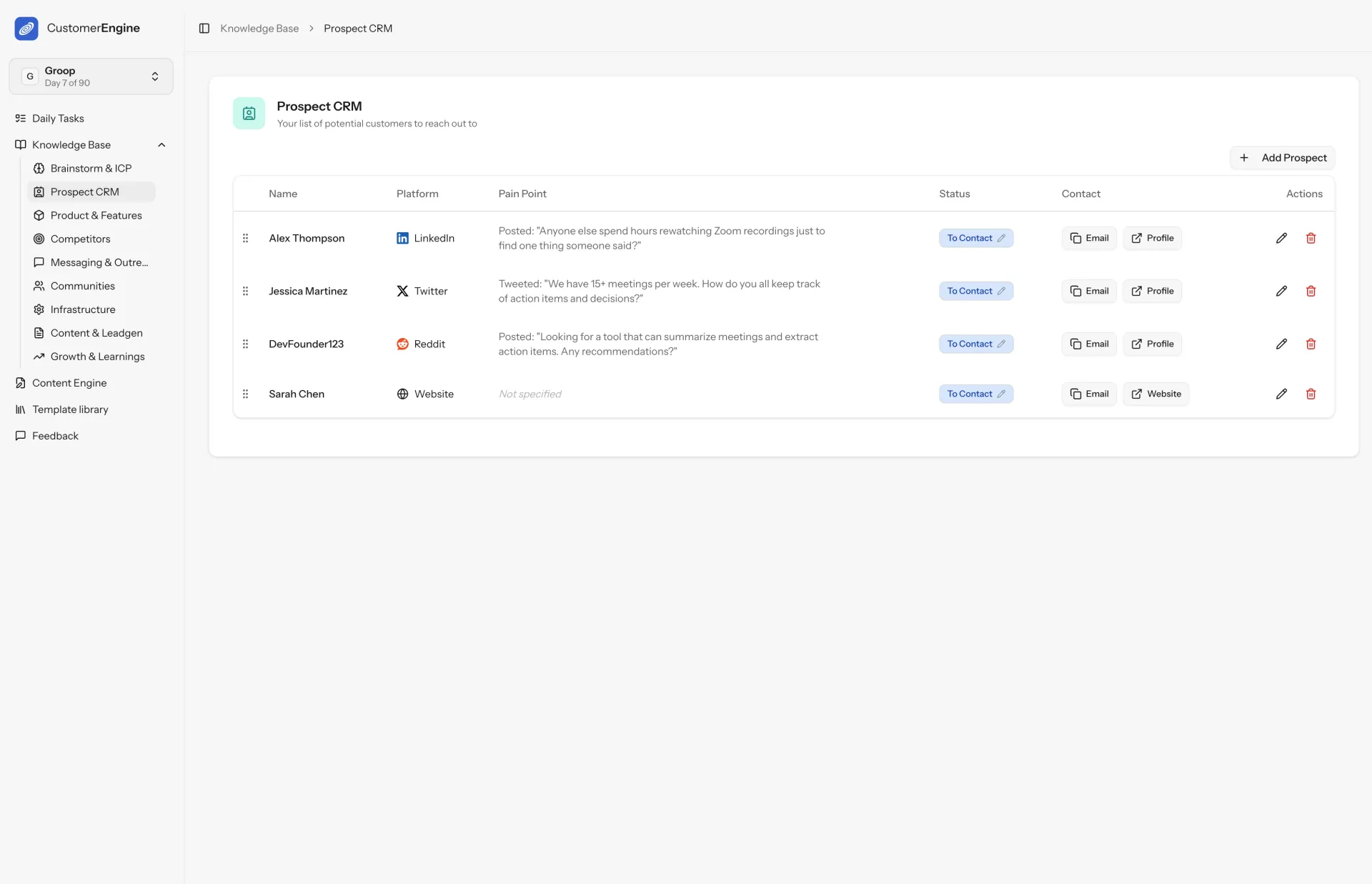
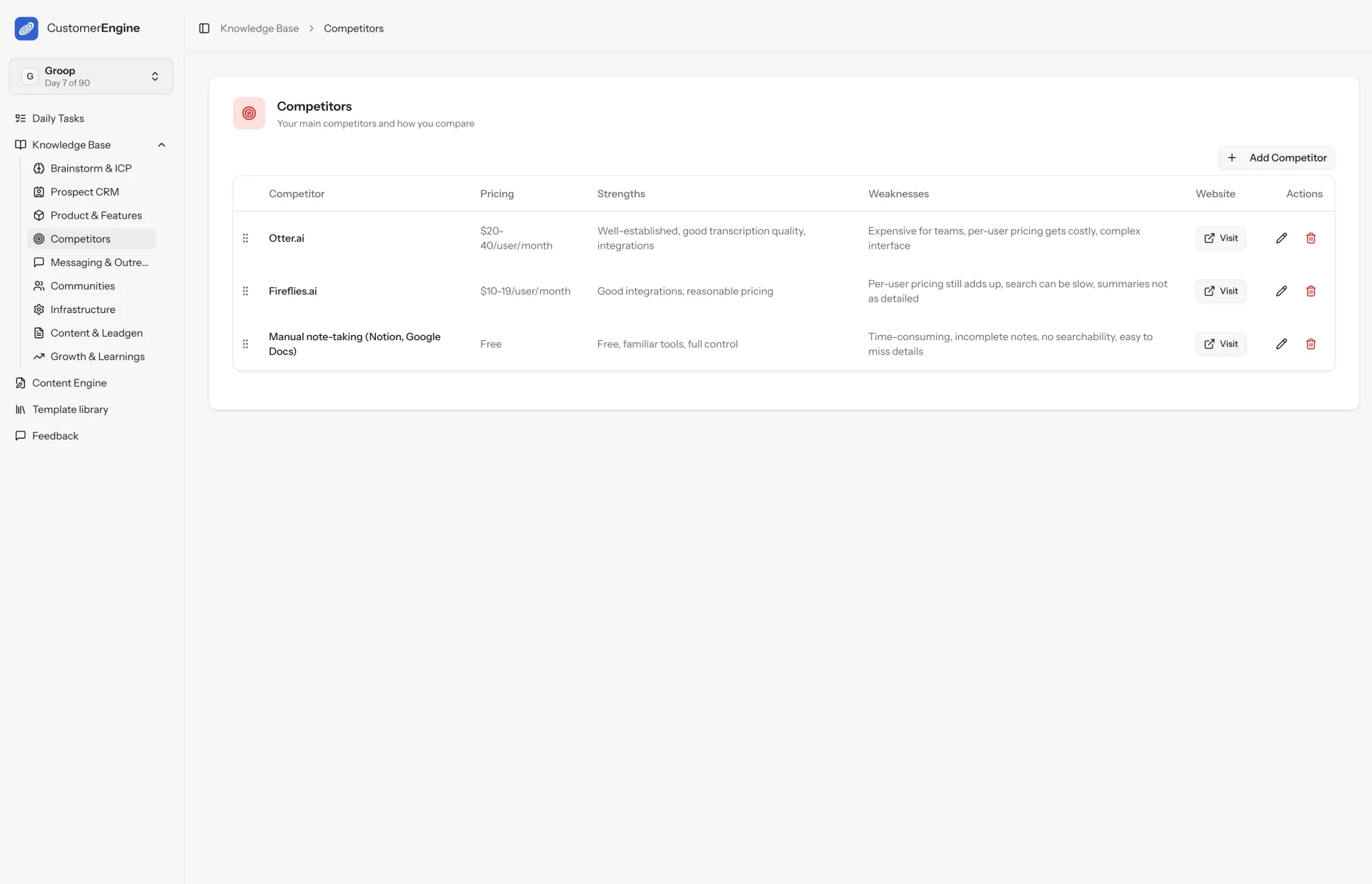
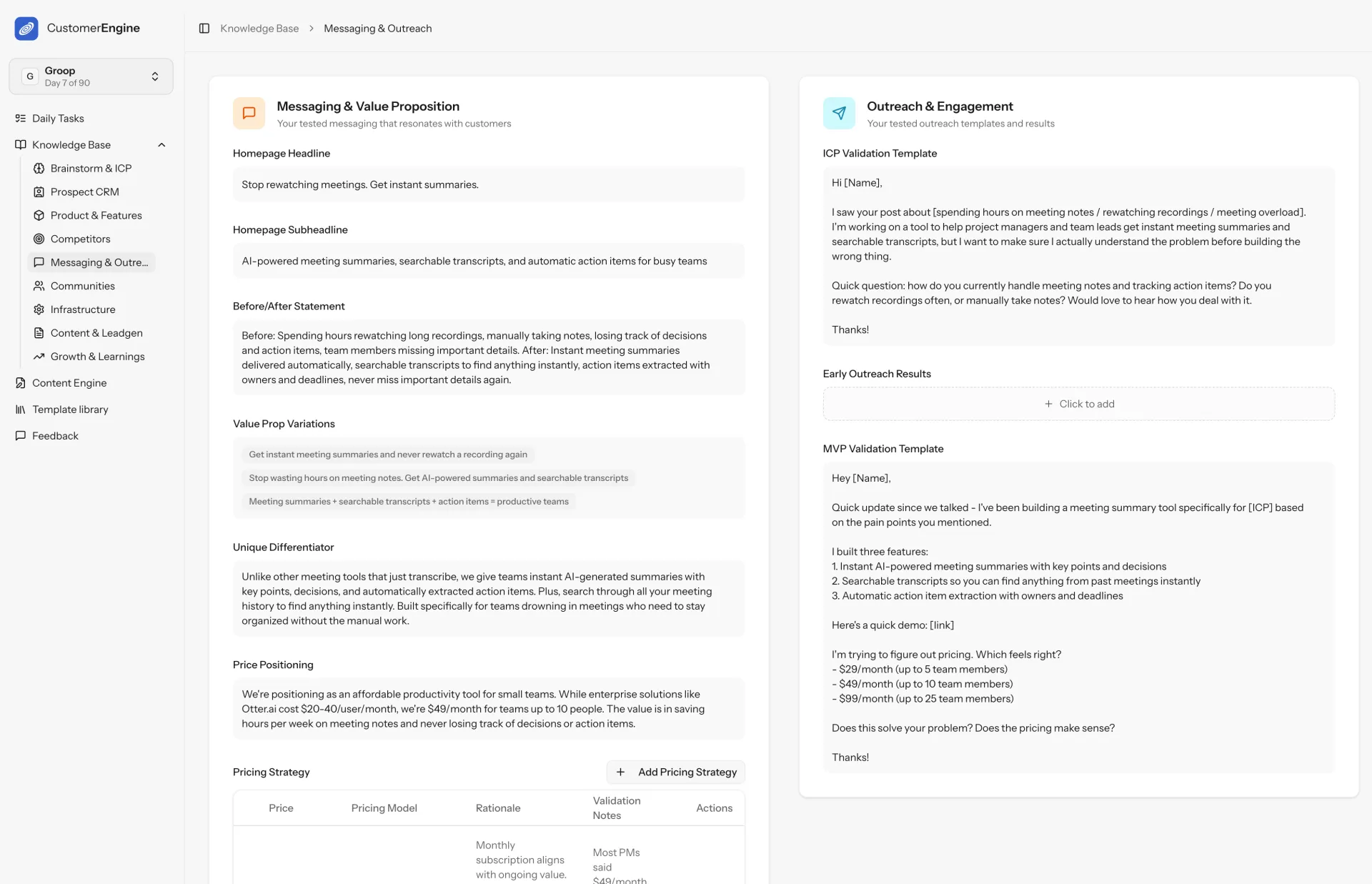
I’m 14 and have been coding for about a year now.
I love building real apps that solve problems — I made a book review app (totally shit), a SIP calculator, and now… something I’m really proud of.
Spenlys — a personal finance app powered by AI that actually gives you advice based on how you spend. Not just charts. Real tips.
I built it to learn next.js and practice but I like it so much that I kept working on it.
I worked on it for 2–3 months and finally launched it on Product Hunt.
Nothing happened.
No comments. No feedback. No upvotes.
It felt like shouting into the void.
I posted on Reddit - auto-removed.
On X - ignored.
On LinkedIn - 2 impressions.
Meanwhile, some chrome extension someone made in 6 hours was trending.
I thought: maybe my product isn’t good.
But honestly, I think I just don’t know how to reach people yet.
And that’s been the hardest part of all this - getting noticed when starting out.
Still, I’m proud.
I learned more in these 3 months than from any tutorial.
And I’m not giving up. I’ll keep building, keep launching, and someday I’ll figure this part out too.
- Don’t track everything. just track these 3:
- how many indexed pages you’ve got (google search console → pages → filter by “indexed”)
- clicks & impressions from ai answers (google search console → performance → filter “search appearance” for ai overviews)
- which urls get traffic from non-branded keywords (click performance → filter out your brand name)
- use gsc console bulk export (go to settings → turn on bigquery export)
- now you get daily data without clicking 20 tabs like a robot
- Want ai results? use raw text. no fluff, no fancy visuals
- ai overviews in search pull clean, direct answers
- they don’t care about pretty formatting, just the info
- if you write, write like you're explaining something in discord. clear and blunt.
- use a site:yourdomain .com search every 2 weeks
- google hides your pages when it wants. this tells you what’s actually showing up
- Want distribution without blog posts or video? post short value drops on reddit, twitter, hacker news
- link to your tool, landing, or how-to page
- this still gets indexed + picked up by ai overviews
- avoid self-promo vibe. just be helpful and blunt
- hot trick: set alerts using visualping dot io for ai answers on your main keywords
- it checks if your site is showing up in ai overview boxes
- not 100% reliable but better than sitting around guessing
- If you're using a static site (like with framer, webflow, or custom build), check log files
- look for googlebot visits on new urls
- if no visit in 7 days, something’s wrong with your internal linking
- don’t waste time on rank tracking tools. they lie half the time. use real traffic and query data.
- remember: AI seo isn't about ranking #1 anymore. it’s about getting cited in ai answers. that’s the game now.
do less. measure what matters. keep the loop small.
PS. want your site to rank on llms like perplexity, chatgpt, and grok? grab a free ai seo report at LM-SEO.com

publishing blogs makes zero sense for b2b startups.
all business dudes use ai for information.
unless you got unique insight which is very very valuable, please don't bother with blogs.
create free tools instead.
ps: try lm-seo .com if you want to start ranking higher on chatgpt and other llms.
- i picked one problem i could solve well. no fancy niche, just something real. i made a landing page that looked clean and answered 3 things fast: what it is, who it’s for, and why it’s different.
- posted a plain text breakdown of it on linkedin + twitter. not "here’s my startup", but "here’s the problem, here’s what i built, here’s what i learned". no links in the post. just told the story. link in first comment.
- reused that same story but tweaked it for indie hackers, a relevant subreddit, and a few slack groups. didn’t copy-paste. rewrote it like i was talking directly to each group.
- picked 5 active discussions every week in places my users hang out. didn’t pitch. just dropped value, shared parts of what i learned while building, then naturally linked to it if it made sense. built trust first.
- every new lead that signed up? i checked where they came from and what pages they looked at. if 10 people came from a reddit post, i doubled down on that subreddit and posted again 2 weeks later with an update. same energy.
- made a searchable faq-style public doc with answers to questions users asked me over dm or email. google indexed it. now random long-tail queries are sending organic traffic.
- seo note: i didn’t chase big keywords. i targeted weirdly specific phrases people actually google when they’re desperate. example: “how to sell a chrome extension without a website”. that kind of stuff.
- this all takes consistency, not money. i spent 30 min a day max. some posts flopped. some blew up. but it stacks up. and 2 months later, leads still trickle in daily.
no secrets. just showing up in the right places with something useful and not sounding like a tool.
PS. founders waste months chasing irrelevant metrics. I help focus on what truly matters at ZeroToCustomers.com

- i only build stuff i can grow without cold dms or paid ads. if i can't get users by just posting online, it's dead to me.
- i watch what small creators or indie devs complain about in public. not big accounts. the smaller ones show real pain. check replies on x and producthunt comments.
- i hang out in niche reddit subs and discord servers, but i don’t post. i just watch what annoys people. pain is better than feature requests.
- i don’t look at what vcs are funding. i look at what solopreneurs are using to get unfair advantages. most are quiet about their stack. i pay attention to weird tool mentions on podcasts and small newsletters.
- i write fake landing pages and share them without saying it's mine. if people ask "where can i try this" or "is this real?" i keep going. if it dies, i kill the idea.
- if i can’t think of a clear distribution channel on day 1, i drop the idea. not "i’ll figure it out later". examples: growing via search (seo), x threads, indiehacker posts, webflow template sites, niche telegram groups.
- i search for keywords with low volume but high buying intent. like “free notion generator” or “convert csv to json tool”. you don’t need traffic. you need intent. most ideas don’t die from no users, they die from wrong users.
- the idea must feel like cheating. if it doesn’t feel like i’m giving someone an unfair shortcut, i won’t build it.
- i stalk appsumo, gumroad, f5hub, and newsletter directories for products that got 100+ upvotes/comments but no decent execution. it shows there’s interest, just bad delivery.
- if the first version can’t be built with 1 api and 1 nocode tool, i won’t start. speed > scope. get it out fast and ugly.
- if i can answer the question "who will share this without me asking them to?" i know i’m close.
- people don’t pay for “tools”. they pay to skip work or feel in control. i ask myself: does this idea do either?
that’s how i filter 100 ideas into 1 that doesn’t suck.
PS. I post recent SaaS and AI agent ideas making good money at ValidatedSaaS.com so you can skip the waitlists or validation phase, and get paying customers from day one.

About a month ago, I built Threddr. The idea was simple, help indie founders find their first users by, get this, just hanging out on Reddit.
See, people there constantly ask for tool recommendations like, "Is there a tool that does X?" But those posts usually just get lost or drowned in spam.
These questions were goldmines for builders. My idea? A tool to find them, so you could genuinely help people and get your first users without begging.
so i built Threddr. It'd watch Reddit, spot posts matching your product, and even help you draft a natural, non-spammy reply.
launched it super quietly, and then... waited.
Where I Messed Up Big Time
My biggest blunder? I made it totally free. I thought it'd get people in, help me collect feedback, and I'd figure out money later.
Instead, users signed up, fiddled a bit, and disappeared. No messages, no feedback, just silence.
Point to be noted "Free users aren't invested, so they won't tell you why they leave. I had no clue if Threddr worked."
That silence killed my motivation. I stopped building, stopped talking, and jumped to a new idea. I also thought it'd go viral by itself. Wrong. No one knew about it because I didn't make any noise. A good idea stays good for no one if it's kept quiet.
What I Learned From All This
- Free users are a bad sign. It's not that they're bad people, but they're just not committed. If something doesn't work for them, they won't tell you. They'll just ghost.
- Feedback isn't automatic. You have to make it so people actually care enough to tell you what's up. That usually means they need to be paying you, or they seriously need what you built.
- Marketing is the real grind. I still hate admitting it, but it's true. Talking about what you're building, over and over, is just as important as the building itself. Probably more.
- Motivation is super fragile when it depends on others. If your energy comes from likes, messages, or numbers, you'll burn out fast. The only way to keep going is to find a reason to show up even when no one's cheering.
If I Could Do It Again
- I'd charge from day one. Even if it's just a tiny one-time fee or a cheap monthly plan. Something.
- I'd talk about it while building, not just after. Show examples, share results, ask for opinions. Even if it feels like yelling into an empty room.
- And I'd just keep showing up. Even when it's dead quiet.
Because now I know...
Silence isn't just bad feedback. It's the thing that kills most products.
- google oauth is a must, 90% of users prefer it.
- skip free trials, charge from day one.
- market shamelessly, talk about your product everywhere.
- respect unsubscribers, their feedback is gold.
- post-launch = 80% marketing, 20% tweaks.
- use your own saas, spot and fix bugs firsthand.
- engage users, email, text, and talk to them often.
- consume quality content, read books, watch documentaries.
- think bigger, don't settle for $10k/month when $100k is possible.
- detach from ideas, if it doesn’t make money, move on.
- landing page = apple quality, sleek, modern, and polished.
- mvp = core features only, follow the moscow framework.
- retention drives revenue, 70% comes from existing users. reduce churn.
- price on value, not competition.
- brand matters - logo, responsiveness, good language.

Reach thousands of active founders looking for tools to solve their problems. Our Featured Product placement guarantees premium visibility with 7,458 weekly impressions for post ads (like you are reading right now).
Get direct access to your perfect target audience - people actively building, launching, and growing startups who are ready to invest in solutions like yours. Limited weekly slots available.
Reserve yours now at huzzler.so/advertise


A little backstory about me I'm a full stack engineer, but I've always leaned more toward backend. During university, my thesis focused on Big Data exploring Hadoop, data lakes, and data meshes. That project sparked a lasting interest in data engineering, which I'm now seriously considering pursuing.
As we all know, building a personal brand is important for standing out and building credibility. I started doing that on X, originally for a different purpose. But after just 3 weeks, I began to see the power of building in public. (If you're on the fence about it, I highly recommend giving it a shot.)
Now I’m thinking of shifting the focus of my “brand” from promoting my tool (which may turn out to be a failed project) to documenting and sharing my data engineering journey instead.
What do you think about this pivot?
What are the best tools to generate app keywords for Google Playstore?
Looking forward to your suggestions!!
1. micro-content on x and linkedin
- post 1-2 sentence tips daily about your niche.
- join trending threads on x with thoughtful replies to get eyes on your profile.
- pin a post linking to your landing page, but make it value-first (like a free guide).
- spend 20 minutes a day engaging, and you’ll build a following without ads.
2. collaborate with other founders
- dm 3 to 5 indie hackers in your space for a newsletter swap or blog guest post. i got 200 signups from one swap.
- offer to write a case study for a complementary tool’s blog - free exposure, high trust.
- join indie hacker meetups (virtual or local) to find collab partners.
- keep it low stakes, small partnerships often lead to bigger ones.
3. low-cost seo experiments
- target super-specific keywords with low competition, like “task manager for remote teams 2025.” i rank 3rd for one and get 10 signups a month.
- write one 1000-word blog post a month packed with practical tips, not fluff.
- use free tools like answer the public to find what your audience searches.
- link to your signup page subtly in every post to drive conversions.
4. leverage user feedback loops
- email every new user after 7 days to ask what they love or hate. i fixed a ui issue from one reply and cut churn by 5%.
- add a feedback form in your app with one question: “what’s one thing we could do better?”
- share quick wins (like new features) on x to show you listen.
- turn happy users into case studies for your site - real stories convert.
tiny bets let you test, learn, and grow without risking it all.
i would like to know what small experiments are you running for your saas..
PS. I give honest feedback so you don’t waste time, money, or effort. Get any kind of help you need at ZeroToCustomers .com

How do we know what business it relates to of the user?

Only 6 months left in 2025.
I don’t want to let them slip by.
Going all in till Dec 25.
Goal: Hit $10K MRR.
There’ll be grind. There’ll be fun.
I’ll share everything here and on X/Twitter
wins, fails, all of it.
I had this random idea a few weeks ago: build a job site specifically for AI people. Thought it would be easy money, you know? AI is hot, everyone needs these skills, I will just sit in the middle and take a cut.
Started coding and telling people about my brilliant plan. Almost everyone was like "dude, don't do this" and "job boards are impossible" and "there's literally a million of them already." But I'm stubborn as hell and had already written half the code by then - login working, job posting system, search, the whole thing. Couldn't just throw it all away.
So I said screw it and kept building and then it really hit me about how insanely hard job boards actually are. You need massive traffic, endless fresh job postings, constant marketing. I have basically none of that.
Now I'm staring at all this code wondering what the hell to do with it.
The AI job space is absolutely packed - LinkedIn, Indeed, plus specialized boards I never even knew existed, all with way more resources than me sitting here refreshing Google Analytics hoping someone visited my site.
Maybe I should pivot this whole thing to a different industry? I've got the infrastructure already built - user accounts, posting system, search functionality. Could probably adapt it for senior care services, local handyman platforms, maybe something in healthcare? Industries where I'm not going head-to-head with tech giants who have millions of users and unlimited budgets.
What would you guys do? Keep pushing in AI jobs even though it seems impossible, or take all this code and try a completely different market? Anyone here made a successful pivot like this, or am I just delaying the inevitable failure?
I know I made the classic newbie mistake here, which sounds even funnier since I'm the creator of willtheyconvert.com - literally an app that tells you "validate first, build later." But my second goal was also learning. I started (vibe?) coding 4 months ago and every project like this pushes my skills forward
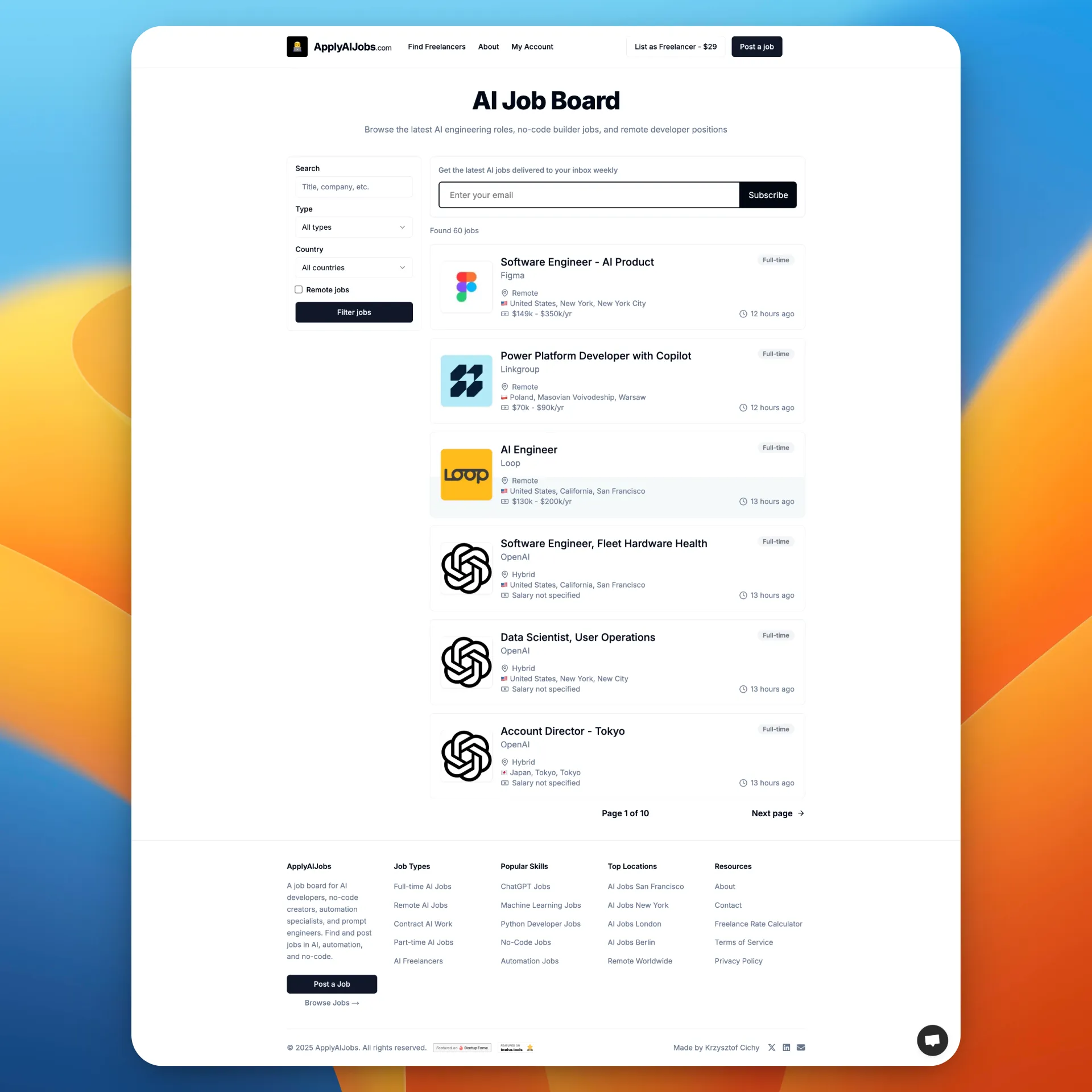
Hello everyone,
I wanted to share how posting and interacting on Huzzler was so much more useful then other mediums.
I posted about my work and what I'm building - already got a lot more feedback and opinions then twitter. There it feels like I'm just posting into a void.
On top of that I got in touch with David (DG) Gordillo trough Huzzler. David was extremely helpful and even helped me get on a call with a Senior Sales Manager and she gave me so much insights on how can I shape the product I'm building. Now I get how people build great offers, I feel like I just got allowed to cheat in the product building game. But it's not cheating it's a fundamental part.
A platform like this really has potential and it can help people in their journey.
Hopefully this gives the Huzzler founders validation and motivation to continue working on this.
Have a great weekend guys.
Hey Huzzlers, Vincent here 👋 (founder of Huzzler).
Working on Huzzler for the last 6 months (2400+ founders, 1400+ products), I've started seeing a pattern: incredible products with 0 customers. It's truly saddening. So much potential, but people don't even know these products exist.
Most founders try to post on Huzzler, Product Hunt, X, Reddit , try ads.. but no results.
So I started wondering, what exactly is the problem? not enough information? bad products? Badly configured ads? ... No influence?
None of that. What worked for me (to grow Huzzler) was creating a system that forced me to:
- Define ONE narrow ICP (stop selling to everyone)
- Update messaging to resonate with that ICP
- Follow a daily routine of tasks
- Build a permanent Knowledge Base
This is why I'm building the Customer Engine: it's a system specifically Built for B2B SaaS founders who need their first paying customers. It works for any kind of B2B SaaS. You can see all features on the website
Why $499 one-time instead of a subscription?
The goal was to create an asset (the Customer Engine) you buy once and profit from forever. No monthly fees eating away at your profits.
E.g. If Customer Engine helps you land just 2 customers at $45/month, it pays for itself in 3 months. After 12 months, that's a $5,000+ ROI.
And that's for only ONE product. You get unlimited projects with lifetime access, so you can use it for every SaaS you build. The ROI compounds. Plus you get all future updates.
(Affiliates coming soon)





Google's Veo 3 is absolutely insane -
idea: a no code platform that lets teams build and deploy ai agents for communication tools like slack, teams, and hubspot to automate tasks and enhance workflows.
problem: teams waste time on repetitive tasks and struggle to integrate ai solutions without technical expertise. this slows productivity and creates friction in daily workflows.
target audience: small to medium-sized businesses, remote teams, and non-technical managers in industries like tech, healthcare, and customer support who need efficient, automated workflows without hiring developers.
interested in 60+ market-proven saas ideas?
each one includes:
✅ the exact solution the problem needs
✅ how hard it is to build (tech, api, infra)
✅ how to get users (traction channels)
✅ proof it works (someone’s already making $$)
i research fast, profitable saas / ai agents and share the best markets every weekend → validatedsaas .com
good luck.
1. brand (where your people are)
- show up on x, linkedin, or niche forums like indie hackers where your audience lives.
- share raw, helpful insights, think quick tips or stories from your journey, not polished fluff.
- reply to comments, join threads, and be human. i’ve had dm convos on x turn into paid users.
- post consistently (2-3 times a week) to stay top of mind without spamming.
2. traction channels (get creative)
- try low-cost experiments like guest posts on relevant blogs or newsletters in your niche.
- affiliate programs are hot, offer 50% commissions to bloggers or micro-influencers who vibe with your tool.
- tap into communities like discord or slack groups; i’ve seen founders drop value bombs in general chats and get signups.
- test one channel at a time, track clicks, and double down when you see conversions.
3. seo (where the gold is)
- focus on long-tail keywords your users actually search, like "best crm for solopreneurs 2025."
- write in-depth blog posts (1500+ words) that answer questions better than competitors. i rank #1 for a niche term just by being thorough.
- use tools like ahrefs or ubersuggest to find low-competition keywords, and optimize with clear headers and meta descriptions.
- link internally to your signup page to drive conversions without being salesy.
4. product (make it shareable)
- build a product so good that users rave about it. one happy customer tweeting about my saas brought 10 signups.
- add a “refer a friend” feature with a small discount or perk, it’s low effort, high reward.
- ask for testimonials right after a user sees value (like after a key feature clicks for them).
- make your onboarding smooth as butter so users stick around and tell others.
5. bonus tip: partnerships
- team up with tools that complement yours for co-marketing like a zapier integration or a joint webinar.
- reach out to niche newsletters for a shoutout; i got 50 signups from a $200 sponsorship.
- find micro-influencers (5k-20k followers) who align with your vibe and offer them free access for an honest review.
- start small, build trust, and scale to bigger collabs as you grow.
good luck.

Hello all👋
I’m curious how many projects it took before you finally launched one that worked? And what was the difference with the previous projects?
Drop it below 👇
Not everyone remembers, but back in 2005, Alex Tew had a crazy idea: sell 1 million pixels on his website for $1 each to raise money for college.
http://www.milliondollarhomepage.com/
And guess what? It worked! He made a MILLION USD in just a few months! 😱
Fast forward to today, and people are buying virtual trees for $2 each! 🌳 It’s wild to think about how these out-there ideas can turn into something huge. The moral of the story? Sometimes, a little bit of craziness can create something that catches attention and surprises everyone.
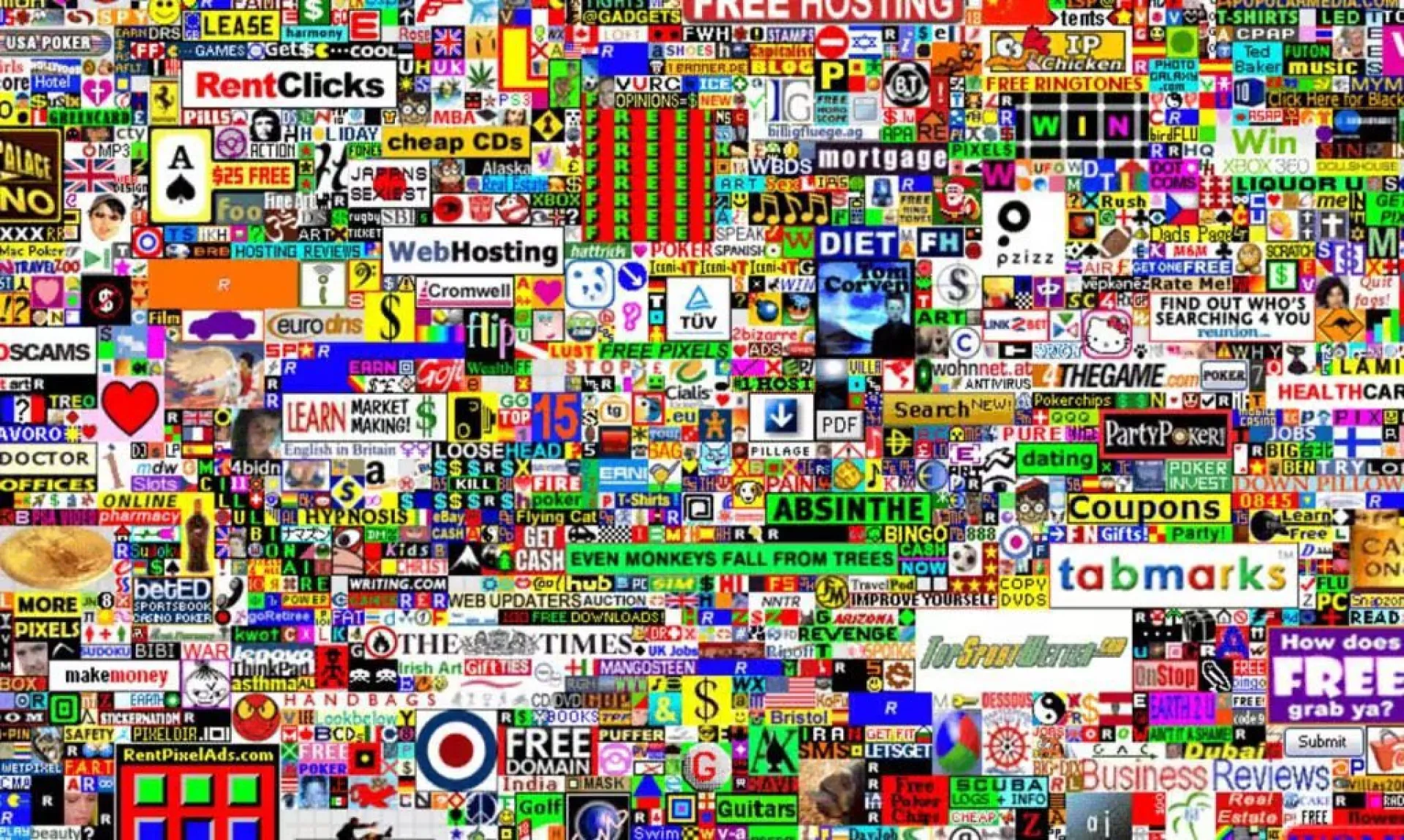
A few months ago, I decided to get started on Reddit—only to get suspended 6 times.
- • First try: Suspended for just commenting.
- • Second try: Suspended again for posting.
- • Third try: Earned 8 karma… then suspended.
This kept happening six times. But on my seventh attempt, I finally made it—no suspension and 30 karma!
- Now, I have:
- • 450+ karma
- • A viral post with 510K+ views (40 DMs!)
That’s when I realized: Reddit is confusing for many people. So, I built MediaFast to help others grow safely — not just on Reddit, but also on X and LinkedIn.
Today, I’ve built an audience of 11,000+ followers on LinkedIn and 2,000+ on X - all by posting consistently and learning what works on each platform.
Indie hackers: Build a SaaS around YOUR problem. 🚀
BloodTrack helps users effortlessly manage their bloodwork by providing AI-driven insights, personalized health trends, and easy-to-understand analytics. Whether you’re optimizing health, managing TRT, or staying on top of your medical journey, BloodTrack makes blood test results meaningful and actionable.
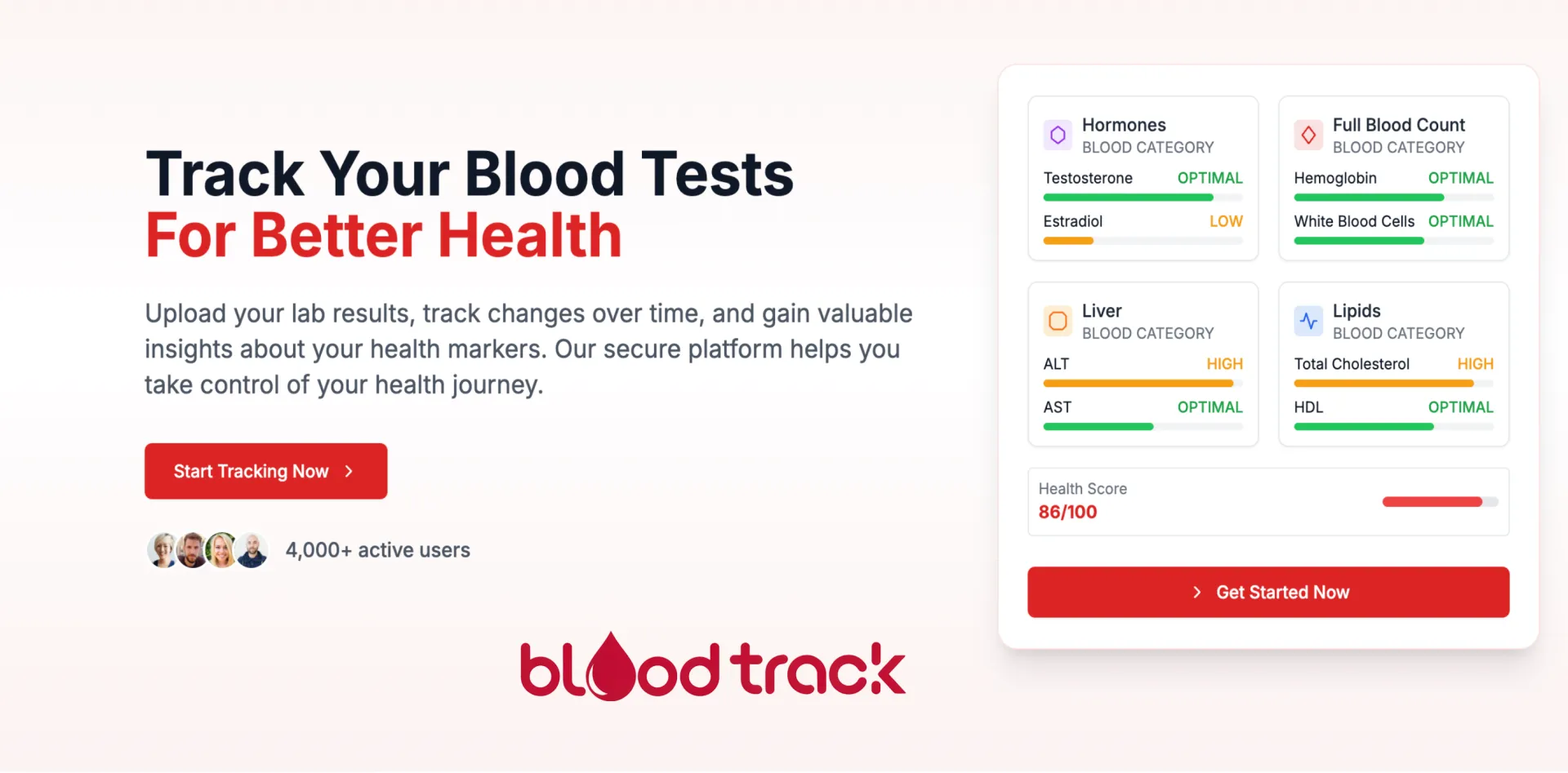
Reach thousands of active founders looking for tools to solve their problems. Our Featured Product placement guarantees premium visibility with 7,458 weekly impressions for post ads (like you are reading right now).
Get direct access to your perfect target audience - people actively building, launching, and growing startups who are ready to invest in solutions like yours. Limited weekly slots available.
Reserve yours now at huzzler.so/advertise


I'll start by saying this isn't a promo post. I'm not affiliated with this startup in any way.
There comes a time in the life of a founder when they must charge users. The staple service used for this is Stripe.
But what happens when Stripe isn't supported in your region? You look for alternatives!
I spent the better part of the last four weeks, checking out Stripe alternatives, some of which were great, and some, not so much.
After much deliberation, I've come to announce the best ever Stripe alternative (IMO); Dodo Payments.
It's easy to use, has great UI/UX, and you can set it up in less than 3 days, with zero to minimum hassles.
It's honestly been a breeze.